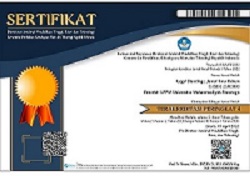Pemblokiran Tanah dalam Sengketa Perbuatan Melawan Hukum: Studi Kasus Putusan Nomor 11/Pdt.G/2017/PN. Btg
DOI:
https://doi.org/10.24269/ls.v9i5.12442Abstract
Land research in the perspective of Indonesian agrarian law is not only seen as a material object, but also as a gift from God Almighty which must be managed for the greatest prosperity of the people as regulated in Article 33 paragraph (3) of the 1945 Constitution and the 1960 UUPA. However, in practice, land often gives rise to disputes due to administrative weaknesses or conflicts of interest, such as in the case of PT Wersut Seguni Indonesia against the heirs of Denny Charso, where land purchased with company funds was registered in a personal name. This dispute demonstrates the important role of the land blocking mechanism as a preventive legal instrument to prevent the transfer of rights before a legally binding decision is made. The research method used is normative juridical with a descriptive-analytical nature. The approaches used are the statute approach and the conceptual approach. The types of data used include primary legal materials, namely the UUPA, PP No. 24 of 1997, Permen ATR/BPN No. 13 of 2017, and related court decisions; secondary legal materials, in the form of agrarian legal doctrine and literature; and tertiary legal materials, in the form of legal dictionaries and encyclopedias. Data collection techniques were carried out through library studies and document analysis, with the analysis carried out qualitatively normatively to interpret legal rules and practices in resolving land disputes. Article 7 paragraph (1) of the Minister of ATR/BPN Regulation No. 13 of 2017 only regulates blocking in criminal cases, whereas field practice shows that blocking is also necessary in civil disputes, such as lawsuits for Unlawful Acts (PMH) and breach of contract. This limitation creates legal uncertainty for the injured party. Therefore, there needs to be a revision of the regulations so that blocking can be applied consistently in all types of cases, so that the law is not only present as a rigid norm, but also as a means of humanistic protection, protecting the rights of the community, maintaining a sense of justice, and preventing further losses.
Downloads
Published
How to Cite
Issue
Section
License

Legal Standing : (Jurnal Ilmu Hukum) is licensed under a Lisensi Creative Commons Atribusi-BerbagiSerupa 4.0 Internasional.
.png)

